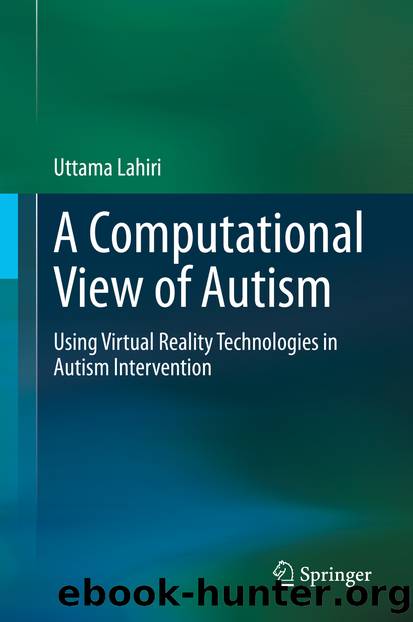A Computational View of Autism by Uttama Lahiri

Author:Uttama Lahiri
Language: eng
Format: epub
ISBN: 9783030402372
Publisher: Springer International Publishing
4.2.4 Reduction in Human Interaction
Predictability in one’s behaviour has an important role in making effective social exchanges. Predictability refers to the essence of estimating the accurate description of events in the future, and there is evidence from literature that individuals often prefer predictability over unpredictability (Steinhauer 1984). The necessity of adjusting to the complex social relationships and getting knowledge so as to be able to predict the behaviour of social partners are important factors in the evolution of human intelligence. Again, human intelligence enables one to adjust to unnatural social situations since human beings are generally capable of picking up and deciphering cues that can help them in understanding the intentions of other fellow human beings (Dautenhahn 1999).
It is well established that children with autism prefer structure, predictability, and consistency (Iseminger 2009) that is often not the case in reality. Specifically, children with autism often fail to pick up cues and in turn experience lack of predictability while considering the occurrence of events as magical (Sinha et al. 2014). Again, lack of predictability in situations and events occurring in reality often leads to anxiety (Abbott and Badia 1986) that is often the case with children with autism.
If training scenarios have structure, are predictable, and offer consistency, then this can lead to effective skill learning by the children with autism since such a scenario can help them to overcome fear and anxiety experienced by them. Specifically, these children feel comfortable in interacting with robots that can be programmed so that its behavioural disposition can be predictable. Additionally, the robot can offer a 3D embodiment that can lend a sense of presence to the learner. However, such artificially intelligent robots are often very expensive. On the other hand, although interaction with humans offers embodied presence and echoes real-life interaction, humans being natural agents often have unpredictability in their disposition. This unpredictability in the human beings might deter the children with autism from interacting with them. In contrast, the VR environment being controllable can offer preprogrammed tasks for skill learning, thereby presenting a structured and predictable environment to the children (Tartaro and Cassell 2007). Further, the soft bots (humanoid avatars) can be designed to serve as communicators and facilitators, thereby offering a sense of embodiment (Standen and Brown 2005). With the computers now becoming cheaper, VR-based training scenarios have become accessible to the public at large.
Download
This site does not store any files on its server. We only index and link to content provided by other sites. Please contact the content providers to delete copyright contents if any and email us, we'll remove relevant links or contents immediately.
Algorithms of the Intelligent Web by Haralambos Marmanis;Dmitry Babenko(8301)
Test-Driven Development with Java by Alan Mellor(6729)
Data Augmentation with Python by Duc Haba(6641)
Principles of Data Fabric by Sonia Mezzetta(6393)
Learn Blender Simulations the Right Way by Stephen Pearson(6292)
Microservices with Spring Boot 3 and Spring Cloud by Magnus Larsson(6166)
Hadoop in Practice by Alex Holmes(5959)
Jquery UI in Action : Master the concepts Of Jquery UI: A Step By Step Approach by ANMOL GOYAL(5807)
RPA Solution Architect's Handbook by Sachin Sahgal(5561)
Big Data Analysis with Python by Ivan Marin(5367)
The Infinite Retina by Robert Scoble Irena Cronin(5252)
Life 3.0: Being Human in the Age of Artificial Intelligence by Tegmark Max(5148)
Pretrain Vision and Large Language Models in Python by Emily Webber(4331)
Infrastructure as Code for Beginners by Russ McKendrick(4091)
Functional Programming in JavaScript by Mantyla Dan(4038)
The Age of Surveillance Capitalism by Shoshana Zuboff(3955)
WordPress Plugin Development Cookbook by Yannick Lefebvre(3806)
Embracing Microservices Design by Ovais Mehboob Ahmed Khan Nabil Siddiqui and Timothy Oleson(3609)
Applied Machine Learning for Healthcare and Life Sciences Using AWS by Ujjwal Ratan(3580)
